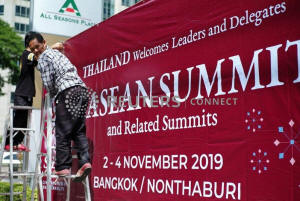U.S.-China tensions spur progress on giant Asia trade pact
 Send a link to a friend
Send a link to a friend
[October 29, 2019]
By Patpicha Tanakasempipat and Matthew Tostevin
BANGKOK (Reuters) - Tensions between the
United States and China have given new impetus to a China-backed trade
pact and there is a chance of major progress, if not final agreement,
when Southeast Asian leaders meet in Bangkok this week, analysts say.
The Regional Comprehensive Economic Partnership (RCEP) could become the
world's largest free trade zone, comprising 16 countries that account
for a third of global gross domestic product and nearly half the world's
population.
Progress since talks began in 2012 has been slowed by disagreements
between members, such as major Indian concerns over a possible deluge of
imports from China. The pact also includes the Association of Southeast
Asian Nations (ASEAN), Australia, Japan, New Zealand and South Korea.
Analysts said the pace of discussion on remaining issues had quickened
this year, as the U.S.-China trade war sharpened concerns over both
economic growth and regional security.
"We are hearing that there is light at the end of the tunnel and it is
already a short tunnel," said Tang Siew Mun, head of the ASEAN Studies
Centre at the Yusof Ishak Institute in Singapore.
"The momentum is now there for the politicians to get this done," he
told Reuters.
Thailand, which currently chairs ASEAN, said this month market access
talks were 80.4% complete and members had agreed on 14 of a total of 20
chapters. Talks with RCEP members will follow the ASEAN summit, from
Oct. 31 to Nov. 4, in Bangkok.
"Some Southeast Asian nations would like to show that they can keep the
regional integration show on the road, despite the U.S.-China tensions,"
said Benjamin Bland, director of the Southeast Asia project at the Lowy
Institute in Sydney.
In Asia, China is not alone in feeling the pressure of the trade war.
Although some companies have moved production from China to escape U.S.
tariffs, the International Monetary Fund (IMF) forecasts growth in
ASEAN's top five economies will fall to 4.8% this year from 5.3% in
2018. It expects India's growth to slow to 6.1% from 6.8%.
Countries that used to rely on the United States as a counterweight to
China's growing regional dominance are also increasingly doubtful if
they can.
RCEP members including India, Japan, Malaysia, South Korea and Thailand
all have large trade surpluses with the United States - a bugbear for
President Donald Trump.
U.S.-Thai trade relations have been strained, with Washington
withdrawing trade preferences on $1.3 billion in Thai goods last Friday,
accusing Thailand of failing to protect workers' rights.
"WARNING SIGN"
"The trade tensions should be the final warning sign that Asia needs to
have a collective platform and a place for engaging in economic issues,"
said Deborah Elms, executive director of the Asian Trade Center based in
Singapore.
[to top of second column]
|

Workers put up a sign to welcome leaders to the 35th ASEAN Summit in
Bangkok, Thailand October 29, 2019. REUTERS/Patpicha Tanakasempipat

It would be a "massive missed opportunity" if leaders did not
announce the success of the pact at this week's meeting, Elms added.
The RCEP trade deal aims to build on the free trade deals that
Southeast Asian countries have with other members.
It has been widely seen as a China-supported alternative to the
Comprehensive and Progressive Agreement for Trans-Pacific
Partnership (CPTPP), which covers 11 countries across the Pacific -
though Trump pulled the United States out of talks before it was
signed.
RCEP, seven of whose member nations are also in the other agreement,
is less ambitious in terms of the areas of trade that would be freed
up and the conditions participants must meet.
But it is still expected to provide a major boost to regional trade,
besides being symbolically important, as the Trump administration
challenges multilateral trade deals.
"Completing the RCEP negotiations as early as possible is of great
significance to the long-term stability, prosperity and development
of the region," Li Chenggang, China's assistant commerce minister
told reporters in Beijing on Monday.
"The negotiations are currently in the final sprint."
Chinese Premier Li Keqiang is confirmed to attend the Bangkok meet,
while the United States has yet to announce any representative more
senior than Assistant Secretary of State David Stilwell.
Last year, U.S. Vice President Mike Pence joined the meeting with
Southeast Asian leaders in Trump's place.
Other issues that may figure at the Southeast Asian summit include
the standoff between China and several regional states over its
sweeping maritime claims in the South China Sea, as well as
Myanmar's treatment of Muslim Rohingya after a military crackdown
drove more than 700,000 into Bangladesh in 2017.
But with Thai hosts keen to show progress on the RCEP deal, analysts
and diplomats say it is shaping up as the most important issue in
Bangkok.
"ASEAN hopes to at least be able to announce that substantial
progress has been made, to ensure momentum is sustained," said Peter
Mumford of risk consulting firm Eurasia Group.
(Additional reporting by Ben Blanchard in Beijing; Editing by
Clarence Fernandez)
[© 2019 Thomson Reuters. All rights
reserved.]
Copyright 2019 Reuters. All rights reserved. This material may not be published,
broadcast, rewritten or redistributed.
Thompson Reuters is solely responsible for this content. |